While there are plenty of reasons why your air conditioner may fail to work, we will focus on why an AC capacitor keeps blowing and what to do in this situation. We did our due diligence when researching this topic to bring you the correct answers.
These are the most common reasons why your AC capacitor keeps blowing:
- Power Surges
- Short Circuits
- Overheating
- Wear And Tear
If your air conditioner has a blown capacitor, restore AC functionality by replacing the defective capacitor. It is ideal to contact a professional to replace it.
This article will tackle in greater depth why your AC capacitor blows out often. We will also discuss the symptoms you should look out for to identify a faulty capacitor. So, continue reading to find out more.
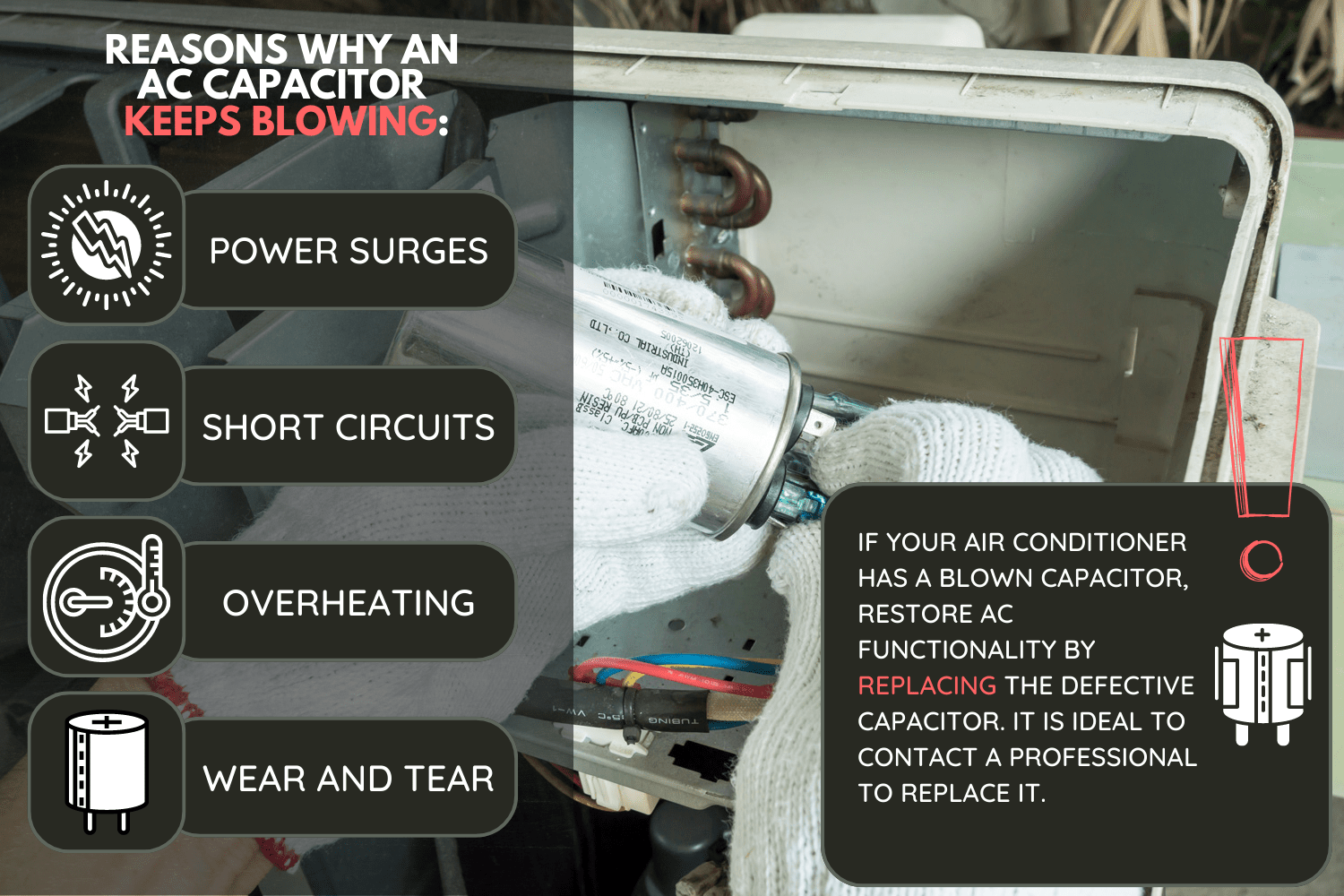
What Causes A Blown AC Capacitor?
Before you learn what to do about a blown AC capacitor, you must first understand why it blows up in the first place. This section addresses the most common reasons that lead to a blown capacitor:
Power Surges
An AC capacitor can't withstand a power surge. It only works under a specific voltage per design; any increase causes it to break apart.
Power surges can also occur during a thunderstorm. When lightning strikes, it can cause an overload to your home system and, in turn, create a power surge throughout your electrical appliances.
Short Circuits
Like a power surge, a short circuit can cause an abundance of electricity to flow into the components, thereby breaking them. However, short circuits happen when electricity travels to the wrong path. This creates a problem within your air conditioner and greatly affects how well your capacitor works.
Regular maintenance can help address any shortcomings that can result in short-circuiting. Consequently, your air conditioner stays in good working condition.
Overheating
When your air conditioner is hard at work, with a portion of it located outside your home, then it's highly susceptible for its system to overheat. Due to intense temperatures, especially during summer, your air conditioner works harder to compensate for the high heat.
When that happens, your capacitor will likely blow out and fail. Too much heat can cause stress on the capacitor's delicate wiring and, in turn, cause it to fail.
Wear And Tear
Over time, your AC capacitor will degrade and break down like any other electrical component. After all, each one has a finite lifespan and will not work forever. Additionally, because the AC sometimes works through harsh conditions, wear and tear will likely happen.
Curious to know how long an AC capacitor lasts? Spare some time to read this article: How Long Does An AC Capacitor Last?
How To Resolve A Blown AC Capacitor
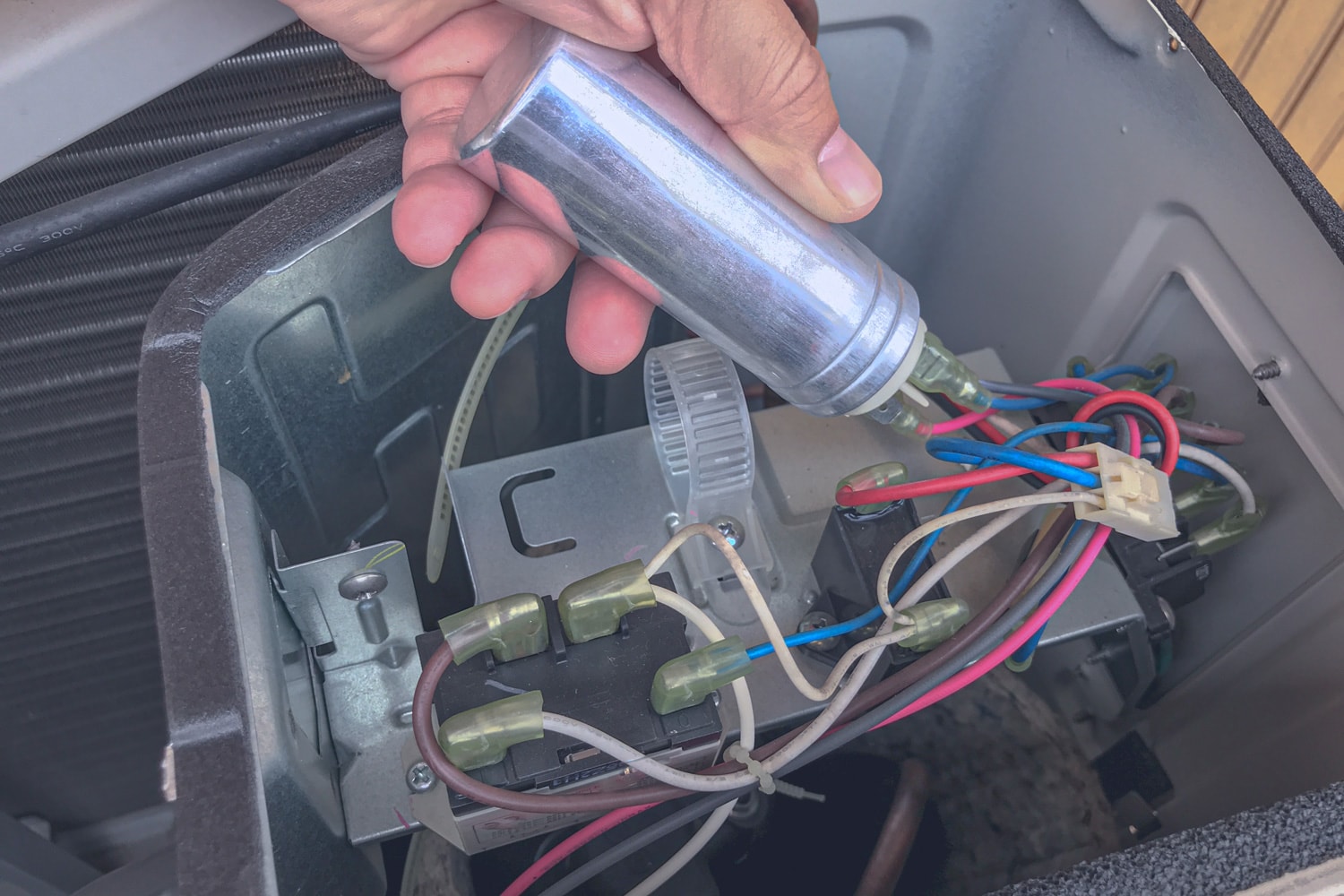
When you suspect that your air conditioner has a blown AC capacitor, the only solution is for you to replace it.
While a homeowner can do this task independently, it's not something most experts recommend. The electrical wiring and components inside the air conditioner can cause fatal accidents to those with little or no experience.
So, it's best to call for a professional to inspect and change a blown capacitor.
Check this AC capacitor on Amazon.
What Are The Signs Of A Faulty AC Capacitor?
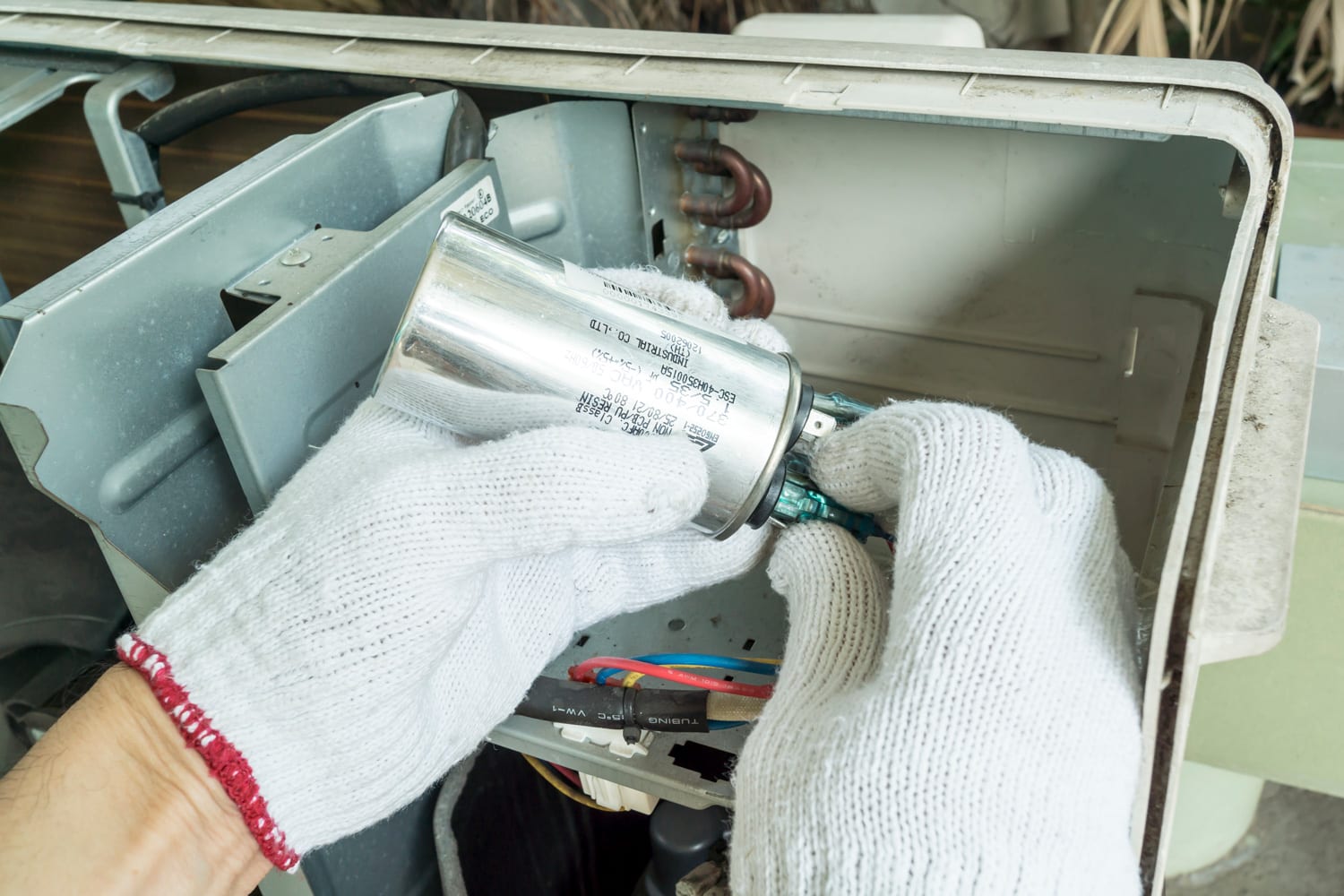
If you want to tell whether your air conditioner is suffering from a blown capacitor, then this list will help you. These are most of the common symptoms that tell you that the capacitor is faulty:
AC Fails To Blow Enough Cool Air
One of the first signs when dealing with a blown capacitor is when your air conditioner starts blowing warm air. Since the capacitor is responsible for sending bursts of electricity to get the cooling cycle going, this is a telltale sign that you're dealing with a faulty capacitor.
On top of that, the capacitor takes the lead role over other motors. So, when your capacitor isn't working properly, it affects the whole system's performance. As a result, you get warm air coming out from your machine.
Burning Smell
Due to the system overheating, a burning smell often comes next. So, when the scent of rubber and plastic comes from your air conditioner, know there's a problem. This usually happens due to wear and tear from your system's electrical components.
Applying some lubrication will help remedy the issue in the short term but replacing the capacitor, and other affected parts is the best long-term solution.
Humming Noise
If you hear something close to a humming noise, it's highly likely that your capacitor is under stress or is already faulty. To check whether or not the capacitor is at fault, try shutting the air conditioner down before turning it on again to see if that resolves the issue.
If the issue persists, it's time to call in a professional to have a look. The HVAC expert will conduct a series of tests and check whether other components besides the capacitor need replacing.
Rising Energy Bills
An AC with a faulty capacitor works at a sub-optimal pace. This inefficiency increases the unit's energy consumption. So, you waste energy and end up with an empty wallet.
By replacing the capacitor, you save money in the long run and avoid dealing with a broken air conditioner.
Intermittent Power
Another sign that shows you have a faulty capacitor is when your air conditioner suddenly shuts down for no reason. This intermittent way of working is due to the capacitor failing to fire up the cooling cycle.
Then, the system works under strain, causing it to overheat. The air conditioner then shuts down after a certain time to avoid developing more problems.
It Doesn't Start
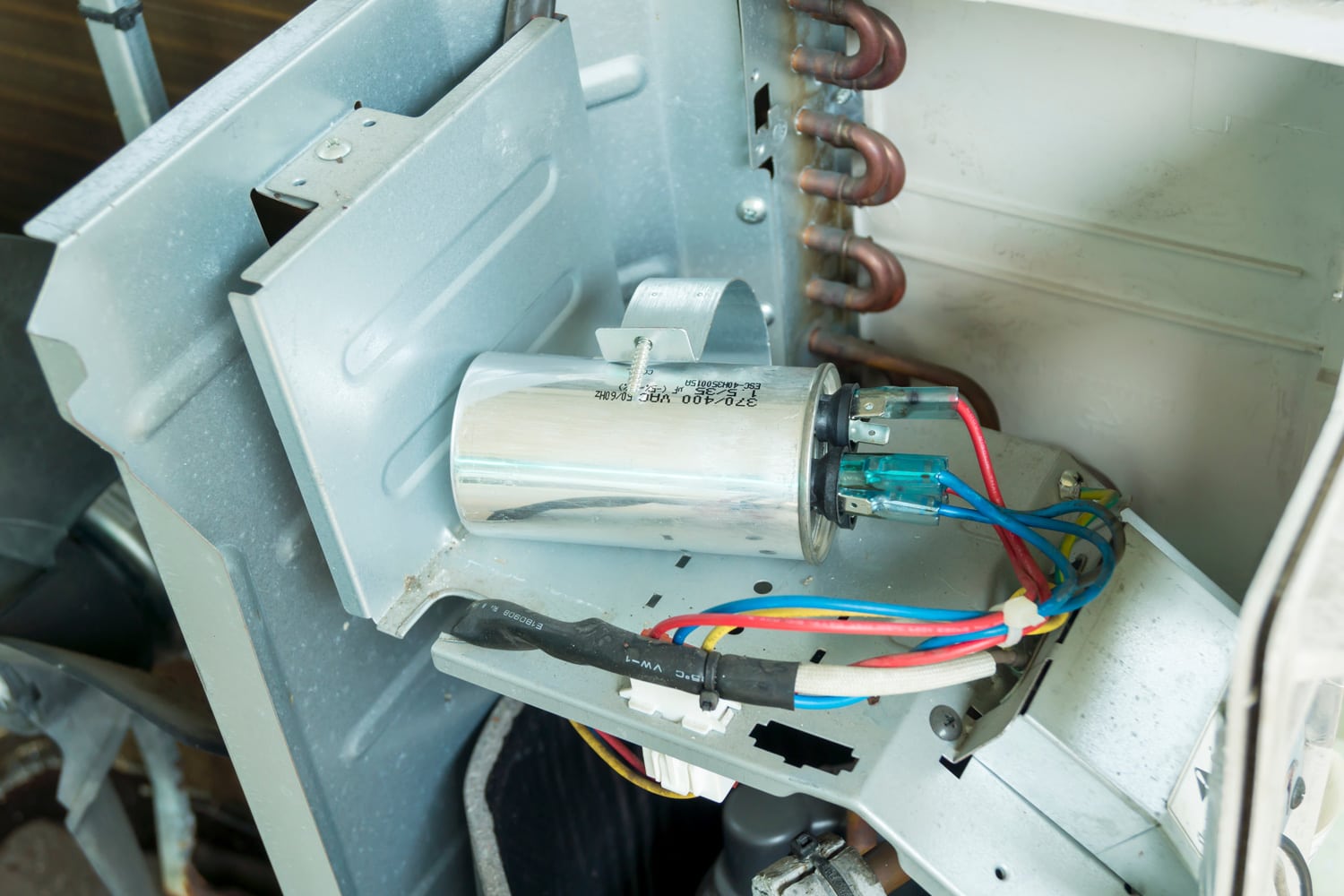
Sometimes, your air conditioner doesn't shut down randomly. Instead, it just refuses to start at all.
This could be due to the voltage not being compatible with the capacitor. But most of the time, it's because the capacitor doesn't work in the first place and needs replacing.
Outdated Machine
Machines don't last forever. The older they are, the more likely their parts will break down and need replacing.
Often, this results in you replacing the entire system. So, if you own an air conditioner that's at least a few decades old, a faulty capacitor is probably not the only issue. And as such, it's best to replace the entire machine at that point with a brand-new one.
Will An AC Unit Still Work With A Bad Capacitor?
The short answer to this query is a simple no. The capacitor is responsible for starting up most motors within an air conditioner. A broken capacitor will result in an air conditioner that doesn't work or barely works but will die out after a short amount of time.
If you wish to find out more, this article addresses the topic in-depth: Can AC Capacitor Work Intermittently?
How Much Does It Cost To Repair A Blown Capacitor?
The cost to repair a blown capacitor ranges between $60 to $300. Several factors, other than where you live and your budget, could lead to a decrease or increase in price.
First, it all depends on the severity of the problem. Then, the cost of the capacitor itself. Before discussing labor costs, you need to check whether there are plenty of professionals capable of repairing a blown capacitor in your area.
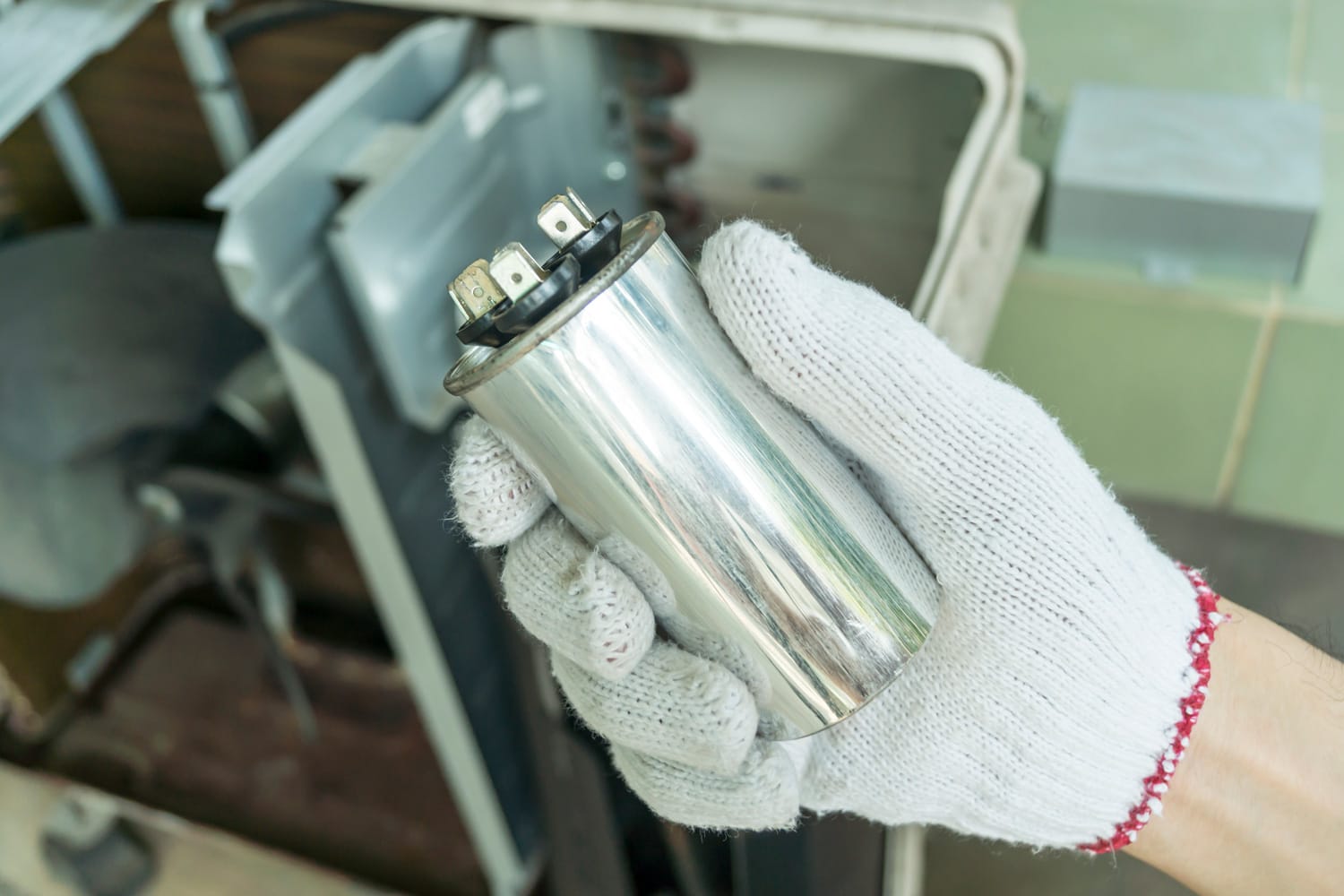
To Wrap Up
Your AC capacitor may blow up due to an electrical surge, short-circuiting, overheating, and natural wear and tear.
Regular maintenance can help arrest some of these challenges before they become full-blown problems. However, if the capacitor blows up, you need to replace it to get the AC running well again.
Did this article help answer the questions you have in mind? If so, why not check our other articles provided below? They both share helpful information about an AC capacitor:
How To Buy The Correct AC Capacitor [Things You Need To Know!]


